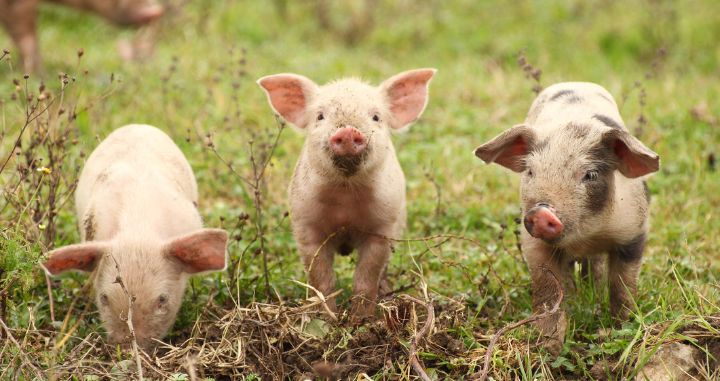
Three piglets, one for each of the comments we submitted to the USDA last month.
At OFRF, we know that strong, transparent, and farmer-informed federal agencies are essential for the success of all U.S. agriculture, but especially organic agriculture. This month, we acted on that knowledge when we submitted three different comments on USDA actions: one to the USDA on their reorganization plan and two to the National Institute of Food and Agriculture (NIFA) on proposed changes to the Application Kit and Scientific Review Process. Each of these actions may seem bureaucratic and technical on the surface, but together they shape the future of agricultural research and technical service delivery.
NIFA Comments
Earlier this summer, NIFA announced that they are requesting public input on proposed changes to its Application Kit and Proposal Review Process. These processes, and the changes described, directly affect the accessibility, quality, and impact of all USDA-funded research projects.
OFRF raised concerns with the proposed addition of a “Disclosure of Foreign Relationships” form added to the Application Kit, related to a recent memo from the Secretary. While framed as a transparency measure, this new requirement risks chilling international collaborations and excluding non-citizen scientists who have long contributed to the strength of the United States’ agricultural research system. Already, we are seeing foreign-born researchers being impacted. Rather than strengthening national security, this has the risk of hollowing out our research capacity and weakening America’s leadership in agricultural innovation. OFRF urged NIFA to pause implementation of this requirement and engage with agricultural communities, from farmers to university researchers, in assessing its real-world impacts on research quality, workforce development, and international collaboration.
In a second Notice and Comment opportunity, OFRF emphasized the importance of peer review as the cornerstone of scientific integrity and accountability. NIFA’s competitive grants depend on fair, transparent, and diverse review processes that balance scientific merit with on-farm relevance. We recommended a variety of pathways for improving the process’s ability to respond to the needs of farmers and reflecting observations applicable to real-world farm operations. These improvements are not just about improving the administration of NIFA’s research grant programs, they are about making sure that USDA research funding is awarded to projects that matter to farmers, communities, and the environment.
Reorganization Comments
In a less formal comment opportunity, OFRF weighed in on the USDA’s proposed reorganization plan, announced on July 25, 2025. This plan threatens to further erode the research and technical service capacity farmers depend on. Our comments highlighted major risks relating to scientific capacity and program administration, and the very public-interest scientific mission this plan aims to achieve. We learned from the relocation of NIFA and ERS in 2018 that when relocation takes place rapidly and without community engagement, there are significant staff losses that persist for years into the future. We called on USDA to halt this reorganization until it engages in a transparent, public process with a cost-benefit analysis, regional listening sessions, and clear justifications for how changes will improve core services.
OFRF’s Commitment
OFRF works to engage in both legislative and administrative advocacy to reaffirm our commitment to ensuring agricultural research is led with scientific merit, farmer relevance, and diverse perspectives. Whether it is protecting the integrity of peer review, opposing exclusionary policies in grant applications, or defending USDA’s research and service capacity, we will continue to ground our policy priorities in the needs of organic farmers as well as the researchers and technical service professionals that support them.
Take Action, Support Our Work
The future of organic research depends on strong, transparent, and farmer-centered federal institutions. If you want to help defend that future:
Together, we can ensure that USDA research and services remain a public good that builds a future for resilient farms and thriving communities.
Eat well and breathe deeply,
Gordon




